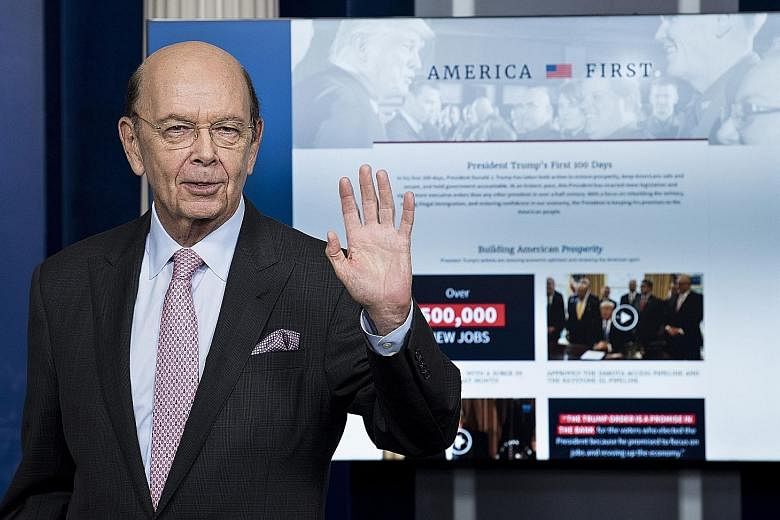US-China trade is looking up after the leaders of the world's two largest economies hit it off at their meeting in Florida last month and agreed on a 100-day action plan.
In an initial trade deal announced by both sides in their capitals, Beijing will allow US beef, banned since 2003, into China by July, give American financial services firms access to the Chinese market, and may import American liquefied natural gas.
The US will import cooked Chinese poultry and, more significantly, send delegates to attend Beijing's Belt and Road Forum starting tomorrow.
Hailing the 10-point agreement, Commerce Secretary Wilbur Ross said: "This is more than has been done in the whole history of US- China relations on trade. Normally, trade deals are denominated in multiple years, not tens of days."
Hours later, US President Donald Trump tweeted: "China just agreed that the US will be allowed to sell beef, and other major products, into China once again. This is REAL news!"
During his election campaign and in the early days of his presidency, Mr Trump often cited the US' nearly US$350 billion (S$492 billion) trade deficit with China, which he blamed for US manufacturing job losses.
-
10 ITEMS IN TRADE DEAL
-
China will lift a ban on American beef and allow for its import no later than July 16.
-
Cooked chicken and duck from China will be allowed to enter the US.
-
China will speed up the approvals of bio-engineered agricultural products from US companies, which are pending licences.
-
American companies will be allowed to ship liquefied natural gas to China.
-
Foreign-owned firms will be allowed to offer credit-rating services in China by July 16.
-
The US Commodities Futures Trading Commission will extend its "no action" relief to Shanghai Clearing House for six months, with further extensions for up to three years. This means that the US authorities will not take enforcement action against the Chinese interbank clearing house, which had failed to register its derivative trading operations.
-
American firms such as Visa and MasterCard will be allowed to offer card payment services in China.
-
Chinese banks will be allowed greater access to the US market.
-
China will issue licences to two American financial institutions to underwrite bonds by July 16.
-
The US will send delegates to the two-day Belt and Road Forum starting tomorrow in Beijing. And it welcomes Chinese investors to take part in an investment summit in Washington next month.
But since he hit it off with Chinese President Xi Jinping last month, he has dropped the idea of labelling China a currency manipulator.
Both sides played up the deal.
In Beijing, Vice-Finance Minister Zhu Guangyao told reporters there had been "nearly 30 rounds of talks to agree on the 10 important points of consensus".
Mr Ross denied suggestions that the deal is linked to US pressure on China to use its economic leverage to get North Korea to give up its nuclear weapons programme.
"Neither we nor the Chinese mentioned North Korea during the negotiations," he said.
Asked the same question in Beijing, Mr Zhu said: "Our economic teams from both sides have a clear understanding that economic issues cannot be politicised."
The two countries will hold high- level talks this summer to be led by Mr Ross, Treasury Secretary Steven Mnuchin and China's Vice-Premier Wang Yang, to work on a longer, one-year plan aimed at addressing US trade concerns.
The economic impact of the agreement - which will start taking effect in July - was unclear. But Mr Ross told reporters that it "will help us to bring down the deficit".
Chinese analysts like Professor Zhao Kejin called it a good start for Sino-US ties. "Clearly both leaders are more interested in getting things done, rather than talking about them," said Prof Zhao, a US expert from Tsinghua University.
"The US' participation in the Belt and Road Forum is most noteworthy. This signals to the world that China and the US are coming together for joint development."
Professor Shi Yinhong, director of Renmin University's Centre for American Studies, said China wanted to avoid potentially drastic measures by Mr Trump.
"So this is clearly a concession on China's part," he said, adding: "It's still too early to tell how Sino-US relations will pan out. There are still so many uncertainties."

